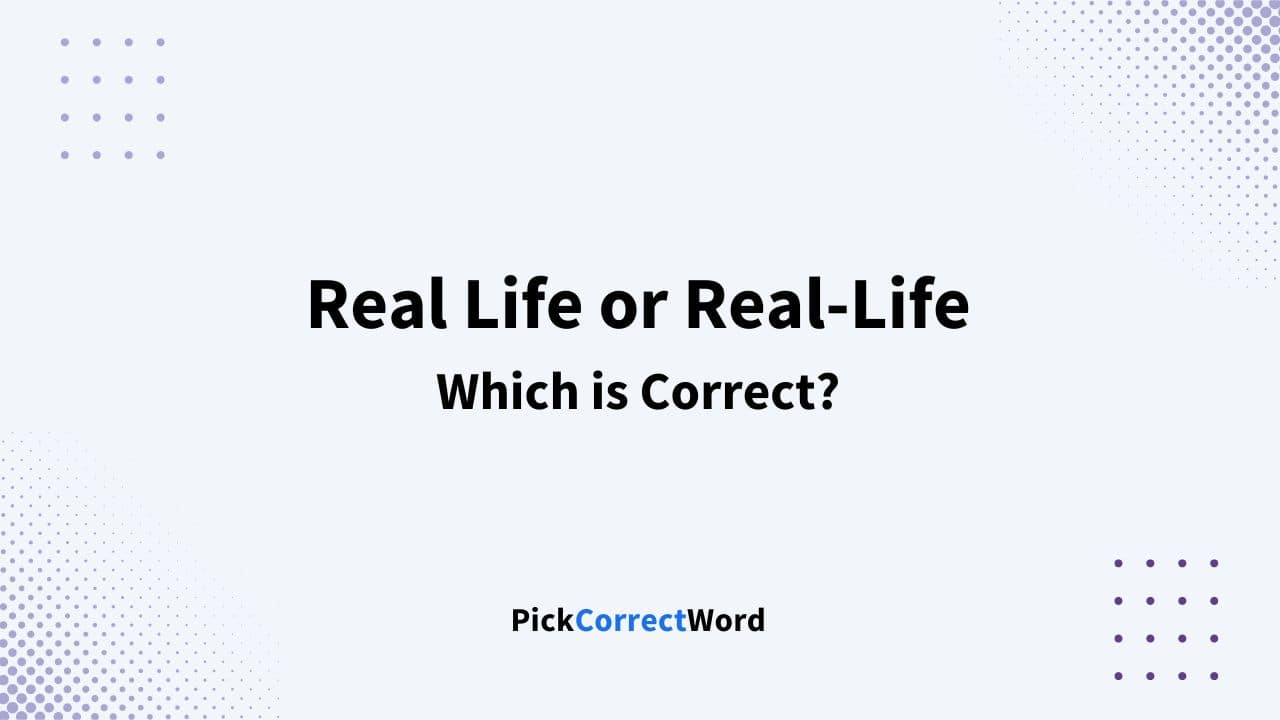If you’re trying to describe genuine experiences or events, you might be unsure if you should write ‘real life’ or ‘real-life’. It’s quite simple once you understand the difference.
You can use ‘real life’ when you’re referring to actual events or situations that happen to people, as it serves as a noun in this case.
However, if you want to describe something happening in the day-to-day world and you’re using it as an adjective, then you can write it as ‘real-life’, with a hyphen.
Real Life or Real-Life? Which is Correct?
Both “real life“ and “real-life“ are correct, but they convey different meanings.
When you say ‘real life’, you’re talking about actual events or existence, as opposed to something that’s made up or idealized. Here, ‘real’ is an adjective that describes the noun ‘life’, showing it’s authentic.
However, if you use ‘real-life’ before another noun, you’re saying that something exists or happens in the real world, not just in stories or imagination. In this case, ‘real-life’ acts like a compound adjective.
Real Life: Meaning and Usage
When you say ‘real life’, you’re referring to actual events or experiences, not things that are made up or imagined. You use ‘real life’ when you’re discussing true human situations without needing any extra words.
- Example: “The movie was inspired by real life.”
Real-Life: Meaning and Usage
But when you add a hyphen to make ‘real-life’, it becomes an adjective. This version is used to describe a noun and indicates that it’s related to real events or circumstances. If you put ‘real-life’ before a noun, it makes it clear that you’re talking about something that’s genuine or non-fictional.
- Example: “The movie was a real-life story of a war hero.”
Hyphens play a key role in English as they can alter the meaning of a phrase. If you’re ever unsure, think about whether the term is acting as a noun, like in ‘real life issues’, or an adjective, providing more details about a noun, like in ‘real-life experiences.’
Examples of Using “Real Life“ in A Sentence
“In real life, things don’t always go as planned.”
“The movie was inspired by real life.“
“His real life is more fascinating than any fiction.”
“The book offers a glimpse into the real life of a professional athlete.”
“In real life, he is very different from his on-screen persona.”
“I find real life situations more intriguing than contrived scenarios.”
Examples of Using “Real-Life“ in A Sentence
“The film is based on a real-life incident.”
“She faced a real-life dilemma when she lost her job.”
“The documentary showcases the real-life struggles of refugees.”
“The book provides real-life examples of successful entrepreneurs.”
“She shared her real-life experiences during the talk.”
“He drew from real-life incidents to write his novel.”
Frequently Asked Questions
How does the meaning of ‘real-life experiences’ differ from simply ‘experiences’?
‘Real-life experiences’ imply events that someone has encountered directly in their everyday life, emphasizing the authenticity and practical aspects. In contrast, ‘experiences’ can include any events or activities, real or imagined, that a person has undergone.
What is the grammatical difference between ‘real life’ and ‘real live’?
‘Real life’ refers to genuine, authentic experiences or situations. In contrast, ‘real live’ is an informal phrase typically used to express excitement or surprise about something or someone present and alive, often in entertainment contexts. For example, you might say, “That’s a real live elephant!” when seeing the animal outside a typical setting.


